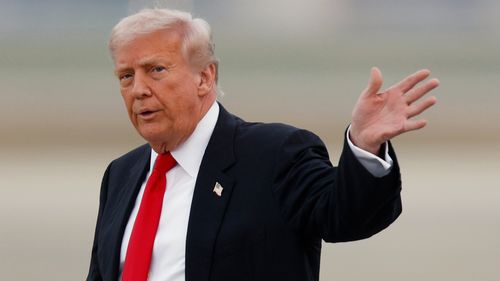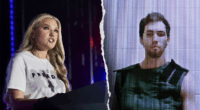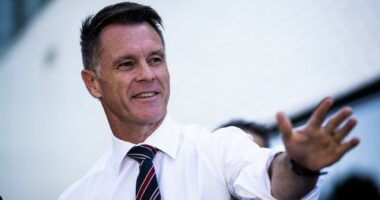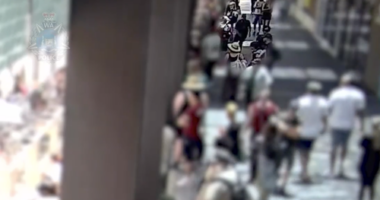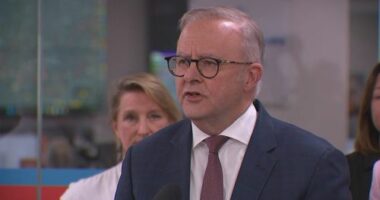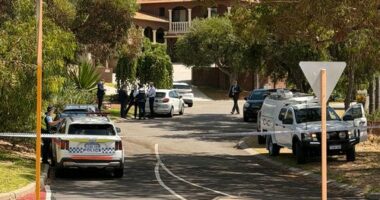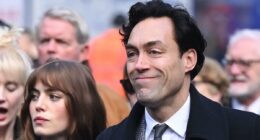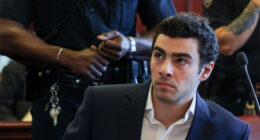Share this @internewscast.com
The BBC is grappling with a leadership upheaval and intensifying political scrutiny following the resignation of its director-general and head of news. The departures are linked to controversy over the editing of a speech by former U.S. President Donald Trump.
Tim Davie, the BBC’s director-general, and Deborah Turness, the head of news, stepped down amidst allegations of bias. Their resignations were met with approval from Trump, who claimed on Sunday (Monday AEDT) that the editing of his speech was an attempt to influence the outcome of a Presidential Election.
BBC Chairman Samir Shah issued an apology on Monday for what he described as an “error of judgment” regarding the editing of Trump’s address on January 6, 2021. This speech occurred prior to the storming of the Capitol by his supporters in Washington.

“We acknowledge that the editing of the speech conveyed the impression of a direct incitement to violence,” Shah stated in a letter to lawmakers.
The controversy centers on the BBC’s Panorama documentary program, which combined three quotes from two different parts of Trump’s speech, delivered almost an hour apart, into a single segment. This edit appeared to show Trump urging his supporters to march and “fight like hell.” Notably, the original speech included a call for peaceful demonstration, which was omitted in the edited version.
Deborah Turness, addressing the situation, stated that the issue was harming the BBC and resigned, acknowledging that ultimate responsibility rested with her.
As she arrived on Monday at the BBC’s central London headquarters, Turness defended the organisation’s journalists against allegations of bias.
“Our journalists are hard-working people who strive for impartiality, and I will stand by their journalism,” she said.

“There is no institutional bias. Mistakes are made, but there’s no institutional bias.”
Trump posted a link to a UK Daily Telegraph story about the speech-editing on his Truth Social network, thanking the newspaper “for exposing these Corrupt ‘Journalists’”.
“These are very dishonest people who tried to step on the scales of a Presidential Election.” He said, calling that “a terrible thing for Democracy!”
White House press secretary Karoline Leavitt reacted on X, posting a screen grab of an article headlined “Trump goes to war with ‘fake news’ BBC” beside another about Davie’s resignation, with the words “shot” and “chaser”.

Pressure on the broadcaster’s top executives has been growing since the right-leaning Daily Telegraph published parts of a dossier compiled by Michael Prescott, who had been hired to advise the BBC on standards and guidelines.
As well as the Trump edit, it criticised the BBC’s coverage of transgender issues and raised concerns of anti-Israel bias in the BBC’s Arabic service.
The Panorama episode showed an edited clip from the January 2021 speech in which Trump claimed the 2020 presidential election had been rigged.
Trump is shown saying: “We’re going to walk down to the Capitol and I’ll be there with you. And we fight. We fight like hell”.

According to video and a transcript from Trump’s comments that day, he said: “I’ll be there with you, we’re going to walk down, we’re going to walk down. Anyone you want, but I think right here, we’re going to walk down to the Capitol, and we’re going to cheer on our brave senators and congressmen and women, and we’re probably not going to be cheering so much for some of them.
“Because you’ll never take back our country with weakness. You have to show strength and you have to be strong. We have come to demand that Congress do the right thing and only count the electors who have been lawfully slated, lawfully slated.
“I know that everyone here will soon be marching over to the Capitol building to peacefully and patriotically make your voices heard.”
Trump used the “fight like hell” phrase toward the end of the speech, but without referencing the Capitol.
“We fight like hell. And if you don’t fight like hell, you’re not going to have a country anymore,” Trump said.
The 103-year-old BBC faces greater scrutiny than other broadcasters â and criticism from its commercial rivals â because of its status as a national institution funded through an annual licence fee of £174.50 pounds ($352.12) paid by all households who watch live TV or any BBC content.
The broadcaster is bound by the terms of its charter to be impartial, and critics are quick to point out when they think it has failed. It’s frequently a political football, with conservatives seeing a leftist slant in its news output and some liberals accusing it of having a conservative bias.
It has also been criticised from all angles over its coverage of the Israel-Hamas war in Gaza. In February, the BBC removed a documentary about Gaza from its streaming service after it emerged that the child narrator was the son of an official in the Hamas-led government.
Governments of both left and right have long been accused of meddling with the broadcaster, which is overseen by a board that includes both BBC nominees and government appointees.
Craig Oliver, a former BBC news executive who worked as director of communications for Conservative Prime Minister David Cameron, said those at the top needed to do a better job of defending the corporation.
“We’re living in a fast-moving digital world where there are a lot of people who want to attack the BBC,” he said.
“It’s been obvious for days now that the BBC needed to step up, explain, apologise, move on. And what we’ve seen is the governance of the BBC saying, ‘we’ll get back to you on Monday â we’ll leave that for days. We’ll allow the president of the United States to be attacking the institution, and we’re not going to properly defend it’.”
